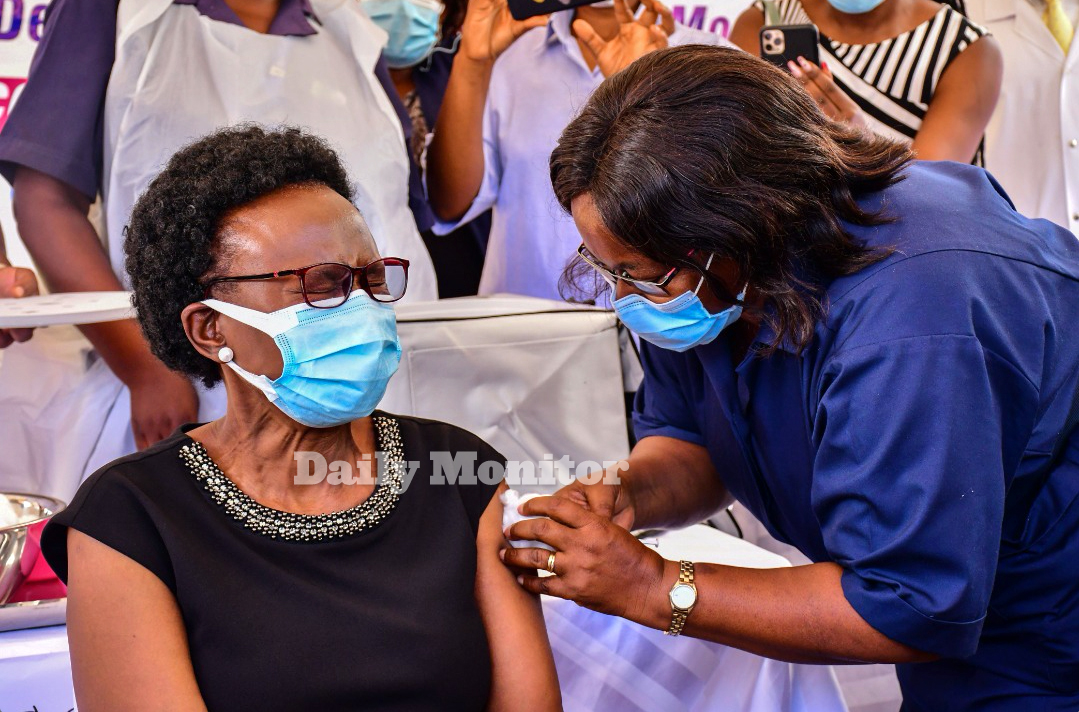What is happening with the AstraZeneca vaccine?
Tuesday March 16 2021

Minister of Health, Jane Ruth Aceng takes the first COVID-19 vaccine jab in Uganda (Photo: Kelvin Atuhaire)
On Wednesday 10th March 2021, Uganda received 864,000 doses of the Atsrazeneca vaccine through the world’s facility for universal access to COVID-19 vaccines, COVAX facility. A day later, Denmark would halt administering the vaccine, a move that would, in the long run, raise questions about the efficacy of the vaccine in the fight against COVID-19.
AstraZeneca is a vector virus vaccine manufactured by the British-Swedish multinational pharmaceutical and biotechnology company of the same name, in collaboration with Oxford University researchers. It uses a harmless cold virus that normally infects chimpanzees as a transport mechanism. This transports the surface protein of SARS-CoV-2 to human cells, where it triggers an immune response against the coronavirus. This differentiates it from the BioNTech-Pfizer’s and Moderna’s mRNA vaccines.
The AstraZeneca vaccine has been praised for its cost-effectiveness and its easy-to-store advantages. I mean, you could store this in a normal household refrigerator for about 6 months. This differs from the others which can stay viable in a normal household refrigerator for about 30 days. Earlier international media reports also praised the vaccine for costing less than a coffee cup.
But now, after Europe set alarm bells ringing over the efficacy of the vaccine, many in Uganda are questioning whether the Ministry of Health should follow suit and halt the vaccination process with this particular brand. With the big European economies like Germany, Italy and France following Denmark, Portugal, Latvia and others in the decision to suspend the use of the vaccine, doubts about it continue to rise.
What is the problem?
This has not yet been determined hence the suspension by European countries and not termination. However, a statement from Denmark suggested that some individuals who had been vaccinated with AstraZeneca had developed blood clots that can be life-threatening. Internal blood clots lead to blockages in the veins thereby disrupting the flow of blood.
Similar cases of coagulation disorders and illness had been reported earlier by Austria. Italy also banned the vaccine the same day Denmark did after reports of the deaths of two men that had recently been inoculated.
Estonia, Lithuania, Luxembourg, Latvia and Romania suspended the use of AstraZeneca vaccine batch ABV5300 (just the batch) following Austria's decision to suspend it after one person died from multiple thrombosis/coagulation 10 days after vaccination.
It is important to note that investigations into these matters have not yet established a link between the vaccine and the blood clots. Therefore, the vaccine cannot be ruled out yet.
“The number of thromboembolic events in vaccinated people is no higher than that seen in the general population,” said the European Medicines Agency‘s pharmacovigilance risk assessment committee (PRAC).
In the same assessment, the European Medicines Agency notes that by March 9th 2021, there were only 22 cases of blood clots out of more than 3 million people who had received the vaccine in Europe.
Should the government ban AstraZeneca?
For the moment, the countries in Europe that have voiced their concerns over the vaccine are simply suspending its use while investigations go on. It is unclear if the chances at the moment favour the vaccine or not.
During the trials, the AstraZeneca vaccine was found to be 82% effective at preventing serious illness or death from Covid-19 after two doses separated by 12 weeks. The vaccine is said to be 76% effective after just the first dose. However, it is important to note that AstraZeneca provided minimal protection against the South African variant (B.1.351) of COVID-19.
The World Health Organization, AstraZeneca, and the European Medicines Agency have insisted the shot is safe, and that there is no link between the vaccine and reported blood clots.
"We do not want people to panic and we would, for the time being, recommend that countries continue vaccinating with AstraZeneca," WHO chief scientist Soumya Swaminathan said Monday.
Scientists in Uganda have also called for calm as AstraZeneca vaccination takes root in the country. On Sunday, Prof David Sserwadda, the government chief scientific advisor on Covid-19 vaccine access and rollout, told The Daily Monitor that there is still no indication that the AstraZeneca Covid-19 vaccine is linked to an increased risk of blood clots among recipients of the jabs as feared elsewhere.
“The reported side effects are not common when compared with more than 300 million doses so far administered globally,” Sserwadda said.
Uganda is left with 2 choices. Either the Ministry suspends the use of AstraZeneca until investigations in Europe are completed in order to protect those who may be affected or place hope in the science with less financial strain and stay on the task of reducing the risk COVID-19 poses.
Some of the information in this article was sourced from AFP, DW, UN, Daily Monitor and the World Health Organisation.


